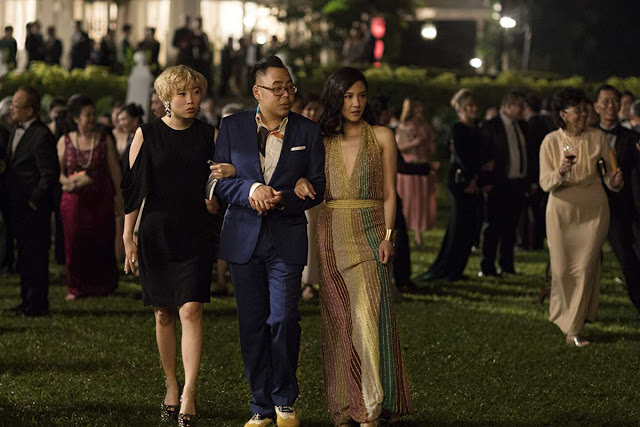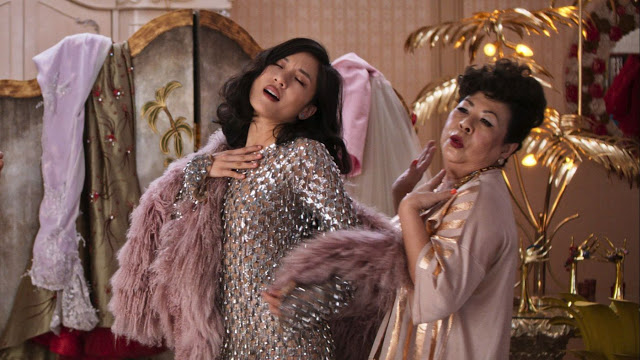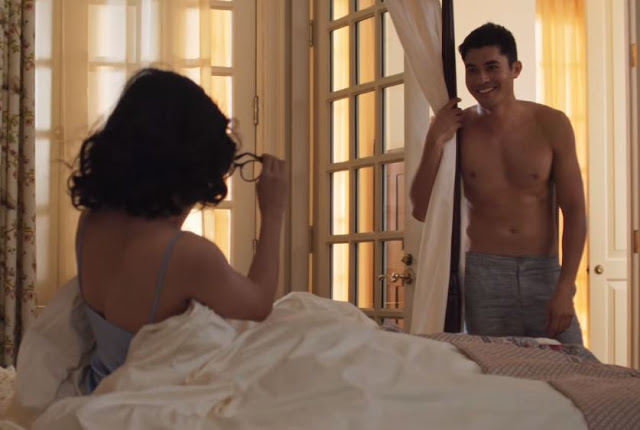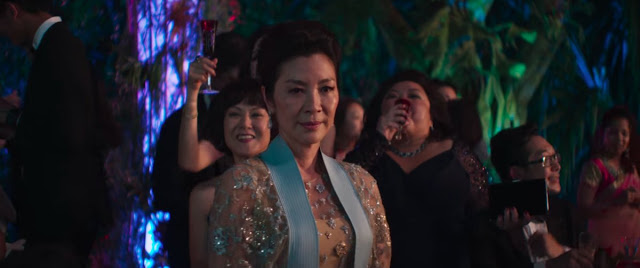There are no princesses with skin as white as snow in Crazy Rich Asians, but it’s a modern fairy tale all the same. Thoroughly clichéd yet undeniably crowd-pleasing, this cheery adaptation of Kevin Kwan’s best-selling novel by no means rewrites the rom-com playbook, but it does flesh out its pages with vivacity and color. Just as there can be wisdom in convention, there can be pleasure in familiarity, and there’s something strangely satisfying about seeing this movie hit all of the requisite beats—the quirky friends, the manufactured crises, the playful montages, the happily-ever-after resolution (oops!)—with energy and enthusiasm. It’s fun to watch, even if you’ve seen it all before.
Except, of course, that you haven’t, not quite. That’s because Crazy Rich Asians is the rarest of Hollywood studio releases: a movie made of Asians, by Asians, and for (though by no means exclusively for) Asians. This long-overdue development may inspire consternation as well as celebration—to quote a different (and of course whiter) member of the genre, “What took you so long?”—but in the spirit of the film’s plucky optimism, I’ll choose to see the good, and to hope that its commercial success may at long last portend increased diversity in American cinemas, both in front of and behind the camera. But while I’m very happy that Crazy Rich Asians exists, I can’t entirely ignore its flaws or exalt it as a model of the form. In other words, it is great that this movie was made; that it was made does not make it a great movie.
Not that it’s a bad one. If anything, Crazy Rich Asians suffers from a surfeit of empathy, striving to understand and explore the messy lives of its many, many characters. This digressive approach takes some attention away from the film’s central couple, the suitably appealing pairing of Rachel Chu (Constance Wu)— an NYU economics professor who is first shown clowning a male TA during a poker hand, a (somewhat dubious) demonstration of game theory designed to establish both her intelligence and her feminine resilience—and Nick Young (Henry Golding), the scion of old-money Singaporean real estate developers. Initially, Nick keeps his immense wealth a secret—in a cute detail, we learn that he uses a Jamba Juice card and mooches off Rachel’s Netflix password—but when he invites her to his best friend’s wedding back home, he’s forced to reveal that he and his family are, in fact, “comfortable.”
I’ll say. In a very narrow sense, Crazy Rich Asians functions as lifestyle porn, allowing us to wallow in the luxuries of the opulent and fabulous. The director, Jon M. Chu—a journeyman whose feature career has been varied to the point of schizophrenic (a couple Step Up entries, a G.I. Joe sequel, the much-maligned Jem and the Holograms adaptation)—doesn’t do anything special with his visuals, but he understands the stopping power of a lavishly appointed mansion or a parade of pastel evening gowns. (The costumes, by Mary E. Vogt, are uniformly gorgeous.) The staggering architecture and glittering gemstones help reinforce Rachel’s wide-eyed sense of awe, as well as her dawning recognition that despite her heritage, she’s an interloper. She knows nothing of this world, and while that results in some typical fish-out-of-water embarrassments (“You’re wearing that?!?”), it also means that her relationship with Nick quickly becomes imperiled.
Well, duh. It is settled law that all rom-com heroes must endure a fretful stretch during which various external forces—here embodied by the towering presence of Nick’s mother, Eleanor (Michelle Yeoh, superbly icy), along with a devious pack of catty and jealous gossipmongers—conspire to thwart their predestined union. What’s odd about Crazy Rich Asians is that Rachel and Nick’s love doesn’t seem all that worth preserving in the first place. We’re constantly told that they adore one another, but the screenplay (by Peter Chiarelli and Adele Lim) provides little genuine evidence of their connection. And while Wu delivers a nuanced and sympathetic performance, she struggles to spark with Golding who, with his chiseled features and lilting accent, certainly looks and sounds the part of a contemporary Prince Charming but who never makes Nick anything more than blandly attractive.
In fact, Crazy Rich Asians stumbles on both sides of the rom-com equation; it is neither especially romantic nor particularly comedic. Silicon Valley’s Jimmy O. Yang shows up as a reckless hedonist who’s designed to function as the maniacal id to Nick’s more restrained ego (think Stifler in American Pie), but Chu is too timid to really let him loose, resulting in a number of limp sequences like a purportedly off-the-hook bachelor party that feels like it was edited for network TV. And while Ken Jeong and Nico Santos—the latter blatantly filling the stereotype of the Supportive Gay Friend—have a few funny lines, the dialogue on the whole never finds any rhythm in its humor. With so many rituals of the obscenely wealthy on display, the film features no shortage of joke targets, but as it turns out, money can’t buy comedy.
It did buy the novel’s movie rights, and the thorny obligation of faithfully adapting such a popular book may explain why the screen version feels somewhat overextended. There are a number of desultory subplots, undoubtedly explored in greater detail in the novel (which, I should disclose, I haven’t read), that feel shoehorned in, creating a bit of a “for fans only” vibe. The character of Astrid (an alluring Gemma Chan), Nick’s glamorous but melancholy cousin, is intriguing, but there’s just too little time here to adequately explore her floundering marriage. Another cousin, Eddie (Ronny Chieng), is considerably less interesting, enough to make you wish his scenes had been cut altogether. And a late development involving the backstory of Rachel’s mother (Tan Kheng Hua), calculated to supply a seismic shock, is too rushed to deliver the impact it requires.
So, there are significant problems. Yet Crazy Rich Asians still proves winning in the end, and what ultimately saves it is its women. Rachel is surrounded by men with flat stomachs and fat wallets, but the most complex and compelling figures in her orbit are two very different femmes. One is her longtime pal Peik Lin (Awkwafina), a spunky, socially dexterous peer described by her father as “Asian Ellen”. Peik Lin is in some ways Rachel’s opposite—worldly and well-informed, but also carefree and crass—but the two still exhibit the closeness that only comes from a lifetime of friendship, and Wu and Awkwafina have an easygoing chemistry that lends their relationship some real warmth and authenticity. (Awkwafina and Santos also revel in the movie’s most classically enjoyable sequence, a Pretty Woman-esque montage of Rachel trying on dresses while her entourage trots out improvised critiques; one multicolored outfit is deemed to look like “a clown’s tampon on a heavy day”.)
The film’s key pairing, however, is that of Rachel and Eleanor. As in any meet-the-parents scenario, Rachel is desperate to please her potential mother-in-law, but she consistently finds herself stymied—not by Eleanor’s cruelty, but by her fierce protection of her son. And Yeoh, in a performance equal parts silk and steel, refuses to turn the character into a caricature, instead revealing a complicated matriarch with her own virtues and blind spots. The movie is never more unpredictable, more alive, than when navigating the choppy waters between these two strong-willed women, a tide that shifts from wariness to antipathy to grudging respect.
And eventually, Crazy Rich Asians acquires a momentum that is impossible to resist. Its third act, often the collapsing point for rom-coms, delivers one standout scene after another: a lovely wedding bathed in culture and light, a freighted game of mahjong that doubles as a cutting lesson in human decency, a breathless proposal on an airplane that succeeds in spite (or perhaps because) of its essential gooeyness. I knew pretty much exactly what would happen at the end of this movie, and I still found myself overpowered by the reappearance of a certain piece of jewelry.
To call Crazy Rich Asians a stone-cold classic is, well, a bit rich. But if you try to run away from its charms, it’ll just chase you down at the airport, sappy speeches and popular music cues at the ready. Its brain may falter on occasion, but it still captures your heart.
Jeremy Beck is the editor-in-chief of MovieManifesto. He watches more movies and television than he probably should.





Jeremy – c'mon. You had me until "blandly attractive." CLEARLY NOT WRITING FROM THE ASIAN FEMALE PERSPECTIVE.
Hahaha, just kidding, sort of. And that will be it for my first and last comment from reading every single one of your reviews.
#HenryGoldingIsADream
Thanks for reading! Clearly you didn't hover over the picture of him, which I captioned as, "No, I didn't Google 'Henry Golding shirtless', why do you ask?"